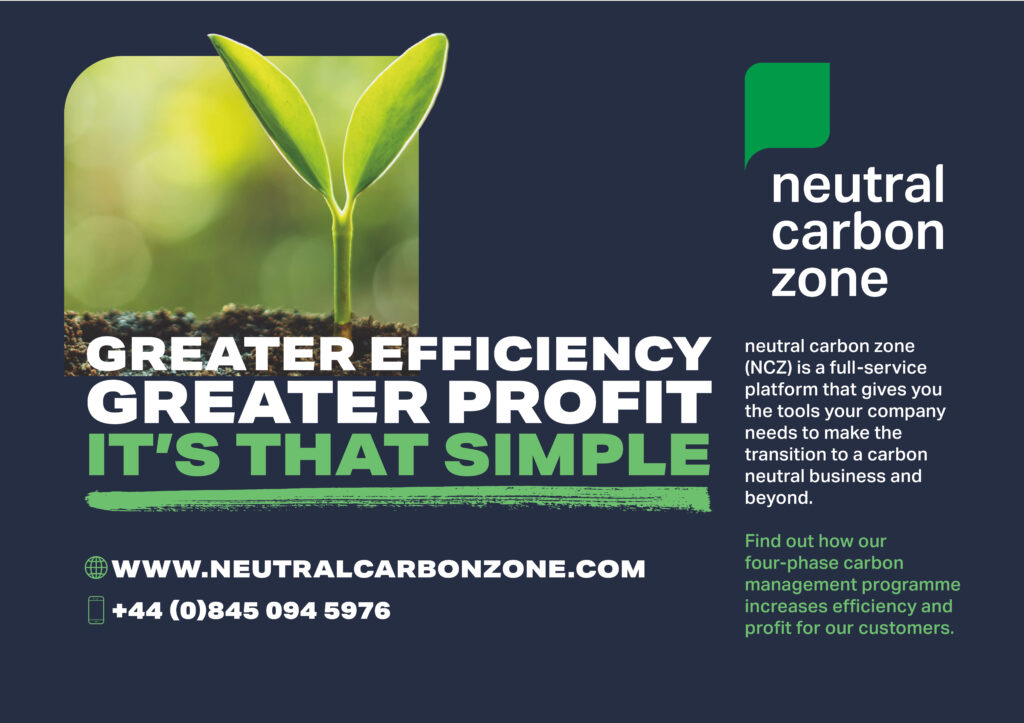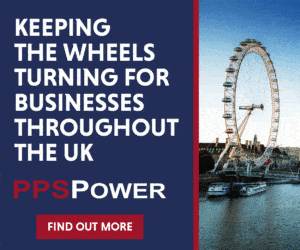Alan Stenson explains his long involvement with the FM sector and his focus on assisting clients to achieve their sustainability goals
With an obvious passion for improving the environment, Alan Stenson continues to combine this with knowledge and expertise to guide businesses toward achieving their net zero carbon emissions ambitions.
He founded the sustainability consultancy Ethical Nation in 2006 and has continued to add further skills and knowledge. The business was formed to assist SMEs to better understand their environmental impact, establish credible reporting and offsetting emissions to become carbon neutral.
“Then at the beginning of 2022, we took things to the next level and launched neutral carbon zone (NCZ), which is a carbon management and certification platform that progresses FM businesses and service providers all the way through to net zero,” Mr Stenson continues.
The new platform was launched to report on and facilitate the reduction and balancing of emissions throughout the entire value-chain for companies within the FM industry. This means NCZ members can manage the emissions of their organisation, services and supply chain, all within one platform “This also enables businesses to report on and influence what would have previously been inaccessible aspects of their wider impact,” he adds.
Mr Stenson further explains that legislation is likely to increase its scope and require more businesses to engage with reducing their carbon emissions.
Currently applying to larger companies, he believes the focus will be widened to include more businesses.
“The biggest drive for change that we’re seeing is the level of expectation being applied to companies by their customers to demonstrate their sustainability credentials,” he continues. “The specific environmental impact of a product/service/supplier, etc is fast becoming the number one factor when companies are deciding who to engage with.
“As a sector, FM reaches virtually all areas and therefore has an enormous opportunity to really lead the way. You only have to look at the 17 United Nations Sustainable Development Goals (SDGs) to see that the FM industry can make a difference in all 17.”
A brighter future
Within FM, Mr Stenson is seeing KPIs included in contracts to assist in the reduction of carbon emissions, while explaining that this is not yet the case for all agreements. He adds that it is “very likely to be just around the corner”.
“I think we’ll start to see legislation roll out further in order to capture more businesses, and more sector-specific guidelines in the future,” he continues. “The pressure will start to increase if too many businesses lag behind.
“I always say when you think about emissions, think pound signs. If you can reduce your emissions, you can reduce your running costs.”
“Globally we need to halve our emissions by 2030 to stay on target for net zero, that’s only seven years away and it’s increasingly likely that compliance could become a mandatory requirement.
“Organisations that can provide a detailed and specific breakdown of what their emissions are, where they’re being generated and how they’re dealing with the reduction and balancing of these throughout the lifetime of a contract will almost certainly have an advantage over those that cannot.”
His dealings with the industry show an increasing number of businesses are engaging with strategies to reduce their emissions and impact on the environment.
“However, without detailed analysis and clear, credible and compliant reporting, and a targeted approach to decarbonisation, it’s easy to spend time on activities that seem positive, but may not necessarily be the most successful or appropriate way forward.
“Our job is to establish where the client is, see what the best options are, and then create a tailored strategy to drive the kind of results necessary to achieve their goals.”

Planning ahead
He further explains that for those wishing to achieve net zero, the best approach is to prepare as fully in advance as possible.
“It’s better to have a strategy in place than being forced to toe the line later. By setting a baseline of emissions, you can clearly see what needs to be done, have more time to do it and more control over setting targets, implementing changes, collaborating with suppliers, and so on.
“I also think that so many more organisations understand that the benefits of embracing this transition to a more sustainable way of business bring significant commercial, social and environmental value,” he continues. “This wasn’t necessarily the case back in 2006.”
With a growing number of FM businesses turning their attention to the need to reduce emissions, Mr Stenson says the creation of a robust carbon management programme is essential. This should break down into clear phases to ensure a comprehensive and structured process can be followed.
“Establishing the footprint of your business is just the beginning. We have established a four-phase programme that consists of: 1. Organisational emissions (company footprint); 2. Operational emissions (product/service footprint); 3. Supply-chain compliance (wider SCOPE 3 supplier emissions); 4. Decarbonisation (emissions reductions).
“Breaking it down into phases will help a business to successfully progress through their sustainability journey and establish ways to integrate targeted efficiencies, so carbon reduction becomes part of the very fabric of the business,” he says.
Mr Stenson further states that there is no “one size fits all” process to achieve net zero. What one company might focus on may not be applicable to or appropriate for another.
“Every organisation will have its own aspirations and requirements, so be clear on what it is that your business wants and needs to achieve. Ultimately, your carbon management programme will have objectives that are committed to achieving those aspirations, but first you need to make a start.
“It’s OK to be in the initial stages if you’re able to communicate where your business is on its overall journey and what the next steps are. This will demonstrate a comprehensive, targeted and structured approach by an environmentally responsible business.
“Approaching this as a tick box exercise or marketing strategy to try and make the business look good will soon prove to be inadequate, or worse, misleading. Our planet needs genuine action so only a genuine approach will do.”
He finds that the recent increased energy costs have resulted in more businesses expressing interest in reducing their consumption and emissions.
“I always say when you think about emissions, think pound signs. If you can reduce your emissions, you can reduce your running costs.
“The shift we’ve seen in prioritising efficiencies to improve commercial sustainability has been one of the driving forces, and now with the energy crisis, this has never been more urgent. Reducing reliance on fossil fuels and reducing overall consumption is clearly good for business and the planet, and it’s our priority to ensure our clients are aware of the options available,” he says.
Good business
For those that achieve net zero status, the main advantages include improving the commercial, social and environmental bottom line of their company.
“This is also the only way to really become a sustainable business. Establishing a comprehensive net zero strategy that delivers in all areas will help to increase profits, attract new business, improve staff engagement and morale, boost supply chain collaboration, attract greater investment and add further value to client relationships.
“Net zero business is good business,” Mr Stenson concludes.





